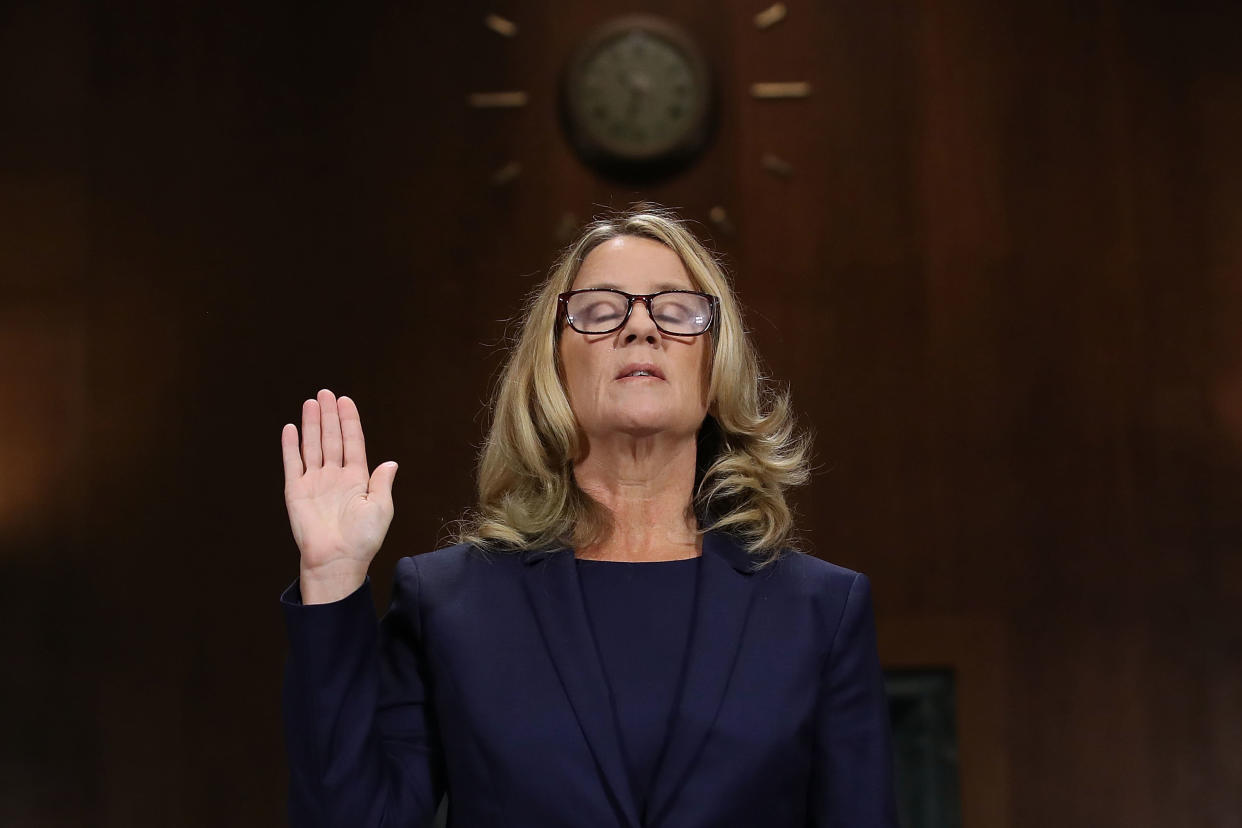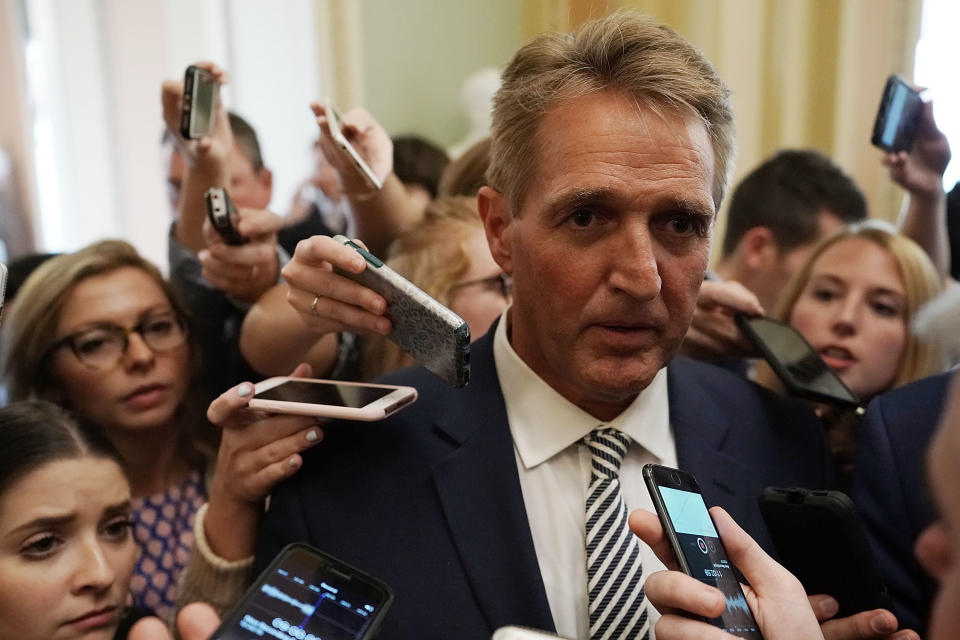Opinion: Dr. Christine Blasey Ford Is An American Hero

In 2012, Dr. Christine Blasey Ford and her husband were renovating their home. She had what her husband felt was an odd request: She very much wanted a second front door. They discussed it in couples counseling and it was then that she first described in detail what had happened to her in the early 1980s.
On Thursday, during Brett Kavanaugh’s Supreme Court confirmation hearing, Blasey recounted the same story for the entire world, detailing the trauma that’s haunted her for three decades and had her advocating for more escape routes in her own house.
You’ve heard the story by now. Brett Kavanaugh ― who is one final Senate floor vote from being Justice Brett Kavanaugh of the United States Supreme Court ― pinned her down, Blasey says, groped her, tried to remove her clothes and covered her mouth when she tried to scream.
“It was hard for me to breathe,” she said in her opening statement, “and I thought that Brett was accidentally going to kill me. Both Brett and Mark [Judge, Kavanaugh’s high school friend] were drunkenly laughing during the attack. They both seemed to be having a good time.”
Blasey went into that hearing knowing GOP senators probably wouldn’t care what she said, that they’d hired a woman to interview her instead of speaking to her themselves, and that she would face a prosecutor while under oath. But she did it anyway.
“I am here today not because I want to be. I am terrified,” she said. “I am here because I believe it is my civic duty to tell you what happened to me while Brett Kavanaugh and I were in high school.”
Blasey’s testimony might not stop Kavanaugh from being confirmed to the Supreme Court. But as Mariame Kaba, an organizer and educator and one of the smartest people I know, put it on Twitter, arguing that Blasey’s actions won’t matter is “insulting,” because she “rightfully knows that she’s not in control of what these GOP ghouls do in the end. She’s putting her experience in the mix. That’s courage.”
And Blasey’s courage will have long-lasting effects. We know this because we’ve seen it before when courageous women faced overwhelming criticism and doubt. Like Dr. Anita Hill, who in 1991 also went before the Senate Judiciary Committee and told the world, in detail, that Clarence Thomas had sexually harassed her. The following year, women, angry after Hill’s testimony didn’t derail Thomas’ nomination, had an unprecedented run at office. It was dubbed “the Year of the Woman.”
The public and the press didn’t look upon Hill at the time as being a hero. She was called a nuisance. She was called a political ploy (as Blasey has been). But now we remember her as the woman in the vanguard who made way for Blasey. And before Hill, there were many women who stood up to power and Blasey now joins their ranks as well.
These include women like Ida B. Wells and Fannie Lou Hamer, who used their voices to stand up to racial injustice; Ann Richards and Shirley Chisholm, who never backed down from politics despite the odds or the criticism; Carmita Wood, who helped found Working Women United after resigning from Cornell in 1975 after facing sexual harassment; or Maya Angelou, who wrote about being sexual assaulted in her 1969 autobiography, I Know Why the Caged Bird Sings.
All of these women faced public ridicule, violence from men and incredible odds stacked against their success. But history remembers them as heroes, women in the vanguard in the fight for freedom who have and will continue to inspire future generations of women and girls.
It may take years for us to understand the ultimate impact of Blasey’s testimony. But we have already started seeing its effects just days out.
Callers into C-SPAN shared their own sexual assault stories. One woman, Brenda, called in during a break in the hearing. I could hear her from the kitchen, her voice pulled me into the living room and had me standing in front of my TV, hand over my mouth, tears streaming down my face.

Republican Sen. Jeff Flake, who had indicated he would vote yes on Kavanaugh, got into an elevator Friday in the Hart Senate Office building, Ana Maria Archila blocked the closing door and addressed Flake directly. “On Monday, I stood in front of your office,” she said. “I told the story of my sexual assault.”
Flake kept trying to leave, the elevator buzzing because the door had been open too long. Still, Archila continued talking. “What you are doing is allowing someone who actually violated a woman to sit on the Supreme Court. This is not tolerable.”
Maria Gallagher then jumped in. When Flake wouldn’t meet her eyes, she said, “Don’t look away from me. Look at me and tell me that it doesn’t matter what happened to me, that you will let people like that go into the highest court of the land and tell everyone what they can do to their bodies.”
Archila told The New York Times she was inspired by Blasey. “When the Me Too movement broke out, I thought about saying it ― but I wrote things and deleted it and eventually decided I can’t say, ‘Me too.’ But when Dr. [Blasey] Ford did it, I forced myself to think about it again.”
Flake announced, just prior to the committee vote (during which he voted for Kavanaugh), that he would be asking for a delay in a final floor vote so the FBI can investigate the multiple sexual assault claims against Kavanaugh. President Donald Trump later announced the investigation would happen.
Flake credits “a lot of people on the phone, in email and text, and walking around the capitol” for his small change of heart. “It’s been remarkable the number of people who saw Dr. [Blasey] Ford and were emboldened to come out and say what happened to them, including close friends.” Who knows what’s next. Gallagher and Archila and their courage, inspired by Blasey’s and in the footsteps of Hill’s, will energize others.
In the end, like Hill, like the brave women before her, Blasey’s legacy and the ramifications of her testifying will outlive this particular confirmation hearing and, ultimately, the Supreme Court justice she testified against. Of the two people who testified that day, only one is a hero and she will be remembered as such.
Jessica Luther is a freelance journalist, an author and a co-host of the feminist sports podcast “Burn It All Down.”
Love HuffPost? Become a founding member of HuffPost Plus today.
This article originally appeared on HuffPost.

